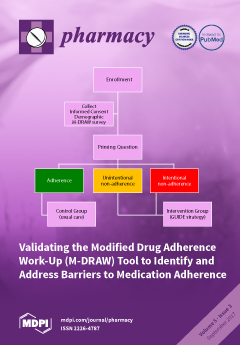Open AccessArticle
Knowledge, Attitude, and Perceptions of Pharmacists and Pharmacy Students towards Pharmacogenomics in Zimbabwe
by
Nyasha Muzoriana 1, Samuel Gavi 2, Victoria Nembaware 3, Milcah Dhoro 2 and Alice Matimba 2,*
1
School of Pharmacy, College of Health Sciences, University of Zimbabwe, P.O. Box A178, Avondale, Harare, Zimbabwe
2
Department of Clinical Pharmacology, College of Health Sciences, University of Zimbabwe, P.O. Box A178, Avondale, Harare, Zimbabwe
3
Computational Biology Group, Department of Integrative Biomedical Sciences, Institute of Infectious Disease and Molecular Medicine, Faculty of Health Sciences, University of Cape Town, Anzio Road, Observatory 7925 Cape Town, South Africa
Cited by 45 | Viewed by 6062
Abstract
The potential of pharmacogenomics (PGx) to positively impact health outcomes and quality of healthcare is well-established. However, the application of available evidence into clinical practice is still limited due to limited knowledge among healthcare professionals, including pharmacists. As a start towards building capacity
[...] Read more.
The potential of pharmacogenomics (PGx) to positively impact health outcomes and quality of healthcare is well-established. However, the application of available evidence into clinical practice is still limited due to limited knowledge among healthcare professionals, including pharmacists. As a start towards building capacity for PGx education, we assessed knowledge, attitudes, and perceptions about PGx among practising pharmacists and pharmacy students. A cross-sectional study was conducted among pharmacists and undergraduate pharmacy students selected using a convenient sampling method—a 37-question survey instrument was used to obtain information regarding PGx among the participants. Out of a total of 131 participants, 56% of respondents showed fair-to-good PGx knowledge. Respondents’ self-reported assessment indicated that 88% had average and above knowledge scores in PGx. Practising pharmacists in Zimbabwe have positive attitudes towards PGx and would support its application to improve treatments. However, there were concerns about security and discrimination when genomics data is used by those who do not understand its meaning. Participants agreed that they would play a leading role in PGx testing if provided with appropriate training. The interest in PGx is challenged by their limited knowledge and understanding of genetics, suggesting a need to update curricula for pharmacy students and for continuing health education programmes.
Full article
►▼
Show Figures





